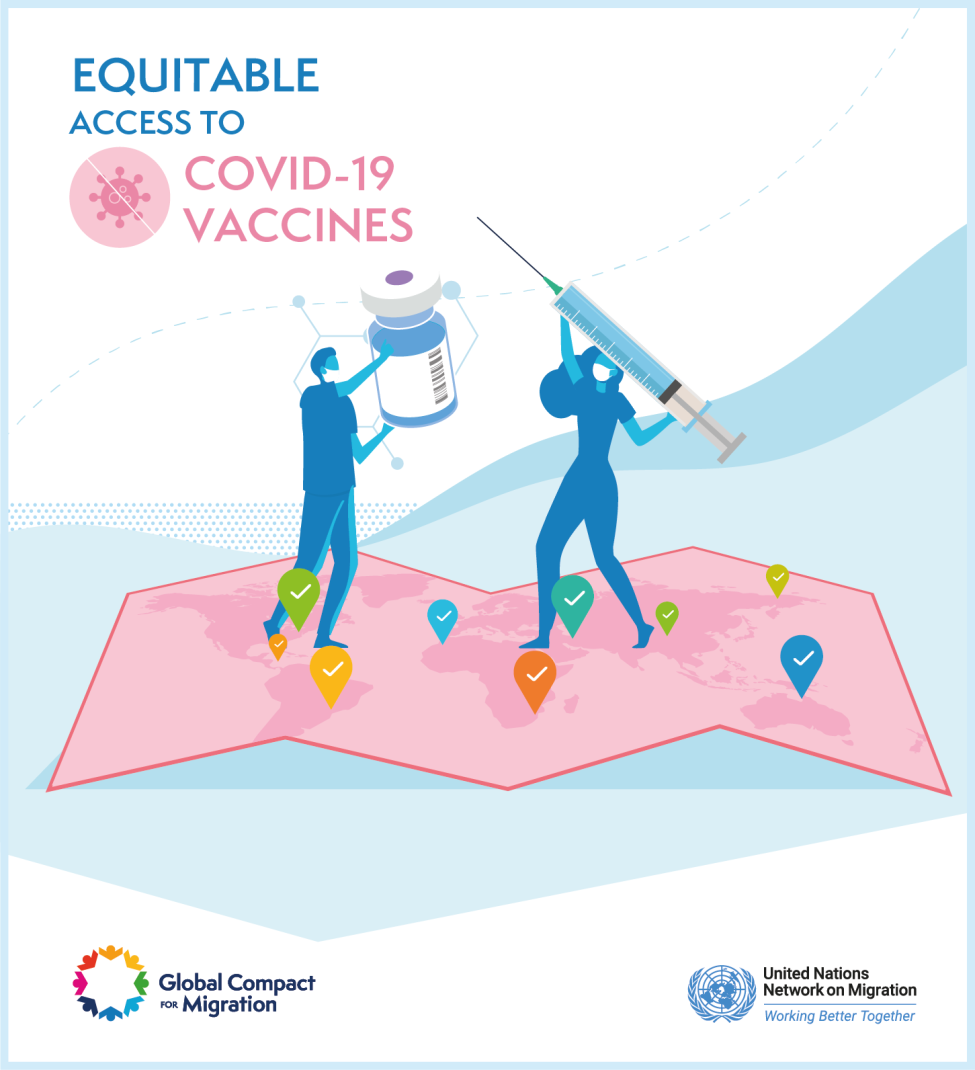-
Who We Are
WHO WE AREThe International Organization for Migration (IOM) is part of the United Nations System as the leading inter-governmental organization promoting humane and orderly migration for the benefit of all. IOM has had a presence in Slovenia since 2001.
About
About
IOM Global
IOM Global
-
Our Work
Our WorkAs the leading inter-governmental organization promoting humane and orderly migration, IOM plays a key role to support the achievement of the 2030 Agenda through different areas of intervention that connect both humanitarian assistance and sustainable development. Across Slovenia, IOM covers different areas of intervention, such as refugee resettlement and relocation, assisted voluntary return and reintegration, and family reunification.
Cross-cutting (Global)
Cross-cutting (Global)
- Data and Resources
- Take Action
- 2030 Agenda
Striving for Equitable Access to COVID-19 Vaccines to Leave No Migrant Behind
Geneva – As vaccine roll-outs are bringing back hope that the end of the pandemic might be in sight, too many migrants remain excluded from national deployment and vaccination plans (NDVPs). Although the number of vaccinations globally has overtaken reported COVID-19 infections, only a quarter of NDVPs submitted to the COVAX Facility[1] include migrants.
The United Nations Network on Migration calls on States to guarantee rapid, fair and equitable access to vaccines for all and the inclusion of migrants, regardless of their status, in their national COVID-19 vaccination programmes and other public health interventions.
Affordable, non-discriminatory access to vaccines is a human right[2]. For everyone to be safe, governments must particularly ensure the vaccination of all high-risk individuals, including migrants in vulnerable situations, within their territories, and base vaccine eligibility and prioritization on public health considerations without discrimination[3].
Migrants in irregular situations are particularly at risk of being left behind. States must ensure that firewalls are erected between health service providers and immigration authorities to ensure their safe access to vaccines and other essential health services. Excluding them or other non-nationals from COVID-19 vaccination plans and programmes carries the risk of transmission in these communities, with spillovers into the entire population.
COVID-19 has exacerbated gaps not only within but also between countries and has highlighted the urgent need for international cooperation by States and all actors to tackle the pandemic in a spirit of global solidarity and shared responsibility. Vaccines should be allocated fairly and equitably and considered global common goods, not marketable commodities. Isolationist health policies anywhere will only continue to pose a threat everywhere.
In this vein, a vast majority of States have joined the COVAX Facility to maximize the quick, safe and fair chances of people in participating countries getting access to COVID-19 vaccines, ensuring that income is not a barrier to access. If used correctly, the equitable distribution of vaccines could help stop the acute phase of the pandemic, support faster, fairer and more equitable social and economic recovery and help us stay on track to realize the Sustainable Development Goals.
Pursuant to the commitments outlined in the 2030 Agenda for Sustainable Development to achieving universal health coverage and in the Global Compact for Safe, Orderly and Regular Migration (GCM) in which States committed to incorporate the health needs of migrants into healthcare policies and plans and provide affordable and non-discriminatory access to basic services, the Network calls on governments to make every effort to address and reduce vulnerabilities faced by migrants by[4]:
- guaranteeing migrants’ inclusion in national vaccination plans and programmes and their equitable and affordable access to vaccines and treatments;
- ensuring that migrants, regardless of their status, can access COVID-19 vaccines without fear or risk of deportation, immigration detention or other penalties as result of migration status;
- mitigating potential cultural, linguistic or other barriers to migrants’ accessing services and vaccines; and,
- increasing efforts to provide vaccines to low- and middle-income countries, allowing migrants anywhere to protect themselves and their communities.
Striving for equity in vaccine access should be a guiding principle for all countries to protect their population adequately. Only by building equal and inclusive societies that will be resilient in the face of future pandemics, and protecting everyone’s right to health, will we build forward better for all of us.
The virus knows no borders or nationality; neither should our solidarity.
|
The United Nations Network on Migration was established to ensure effective, timely and coordinated system-wide support to Member States in their implementation, follow-up and review of the Global Compact for Safe, Orderly and Regular Migration. While the Network’s mandate is focused on migration, the Network calls on States to also implement these recommendations to refugees and asylum-seekers and to protect the human rights and health of everyone equally, regardless of migration status. |
For more information, please contact:
UN Network on Migration (secretariat)
Florence Kim
fkim@iom.int +41797480395
DESA
Helen Rosengren
rosengrenh@un.org
ILO
Adam Bowers
+41 (0)22 799 63 48
newsroom@ilo.org
IOM
Safa Msehli
IOM Geneva +41 79 403 5526
smsehli@iom.int
OHCHR
Rupert Colville
+41 22 917 9767
rcolville@ohchr.org
UNDP
Michelle Alves de Lima
+1 (917) 515-2615
michelle.alvesdelima@undp.org
UNHCR
Charlie Yaxley
+41 795 808 702
yaxley@unhcr.org
UNICEF
Christopher Tidey
+1 917 340 3017
ctidey@unicef.org
UNODC
Ms. Sonya Yee
Tel: (+43) 1 26060-4990
sonya.yee@un.org
WHO
Tarik JASAREVIC
jasarevict@who.int
[1] https://www.gavi.org/vaccineswork/covax-explained
[2] OHCHR’s guidance “Human Rights and Access to COVID-19 vaccines” is accessible here. Committee on Economic, Social and Cultural Rights, “Statement on universal and equitable access to vaccines for the coronavirus disease (COVID-19)”, E/C.12/2020/2, 15 December 2020
[3] World Health Organization’s Strategic Advisory Group of Experts on Immunizations (WHO SAGE) values framework for the allocation and prioritization of COVID-19 vaccination; WHO SAGE Roadmap For Prioritizing Uses Of COVID-19 Vaccines In The Context Of Limited Supply.
[4] In 2020, the UN Network on Migration issued a Policy Brief which provides practical guidance to States and other stakeholders for an improved common understanding of safe and inclusive access to services for migrants. The brief makes the case for enhanced access to services for migrants, including access to vaccines for migrants, in the context of COVID-19 preparedness, prevention, and response – and beyond.
